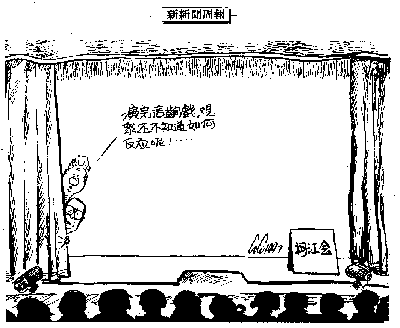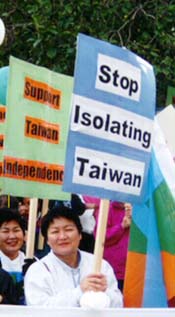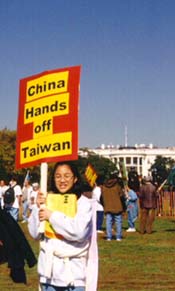 Taiwan
Communiqué No. 78, December 1997
Taiwan
Communiqué No. 78, December 1997 Taiwan
Communiqué No. 78, December 1997
Taiwan
Communiqué No. 78, December 1997
The October 1997 visit of Chinese President Jiang Zemin was controversial at best. One of Mr. Clinton's main arguments for welcoming Jiang Zemin to Washington was that the West - and the US in particular - should not isolate China. We should "engage" China across a wide range of issues, and - with a bit of give and take here and there - attempt to pull China into the mainstream of the international community, so the argument goes.
After the Bill Clinton - Jiang Zemin show: "Why is nobody applauding ?"
On the surface, this sounds like a laudable goal, but the preliminary result was that the US did more giving (nuclear technology, see article titled "Selling weapons of mass destruction to Iran") than taking: China made only a token gesture by releasing Wei Jinsheng two weeks after the visit, and didn't give an inch on human rights itself or any other issue, such as Tibet.
Also, as was pointed out by New York Times columnist A.M. Rosenthal, the argument itself ("engagement" OR "isolation") is a false one: One can "engage" China in a way that adheres much closer to the basic principles of human rights and democracy, and avoid the appeasement and whitewashing of China's repression (human rights, Tibet, East Turkestan), aggression (Taiwan) and transgressions (weapon and nuclear sales to Iran and Pakistan). See Mr. Rosenthal's column, titled A Special Foundation, New York Times, 31 October 1997.

Getting the message through to Mr. Clinton
From the Taiwanese point of view, Mr. Clinton's argument of not wanting to isolate China sounds particularly shrill: he is embracing a repressive dictatorial regime in Beijing, while he is isolating a free and democratic nation, Taiwan.
The arguments for accepting Taiwan into the international community are considerably stronger than those for China:
The Taiwanese people have over the past 20 years achieved a vibrant democracy in spite of a repressive and dictatorial Chinese Nationalist KMT regime, and in spite of an anachronistic "One China" policy.
The Taiwanese live in peace with all their neighbors - except one: China, which tries to isolate it and subjects it to military aggression.
The Taiwanese have shown themselves willing to be a full and equal member of the international community. They are the world's fourteenth largest trading nation and in terms of population they rank 40th largest nation in the world, larger than threequarter of the member states in the UN. Still, it is being blocked by one - China.
Taiwan Communiqué comment: Our appeal to the international community is: do not "engage" China at the expense of a free and democratic Taiwan. Do not isolate Taiwan, but pull Taiwan into the international community as a full and equal member. This is the best guarantee for safety, security, and stability in East Asia.
On 24 October 1997, President Clinton gave what was announced as a major policy speech on U.S.-China relations. It was in preparation of the visit of China's President Jiang Zemin to the United States during the last week of October 1997.
Below is the text of the response by the Taiwanese-American community. In a letter to President Clinton, the President of the Taiwanese Association of America, Mr. C.K. Kuo, wrote:
Dear Mr. President:On October 24th, you gave a China-policy speech at the Voice of America. In that speech you touched - among other issues - on the question of Taiwan's future. You stated: ·And I will reiterate to President Jiang Americaµs continuing support for our one China policy, which has allowed democracy to flourish in Taiwan, and Taiwan's relationship with the PRC to grow more stable and prosper. The Taiwan question can only be settled by the Chinese themselves peacefully. · As Taiwanese-Americans we take strong issue with your statement. It displays a distinct lack of understanding of two most elemental aspects of Taiwan's recent history and our identity: *Taiwan's progress towards democracy didn't have anything to do with U.S. ·...continuing support for our one China policyº. Taiwan evolved towards a democratic political system because of the hard work of the people in the Taiwanese democratic movement, which had to overcome major resistance from the repressive Kuomintang regime (which clung to its anachronistic claim to governing all of China). In fact, the democratization process in Taiwan occurred in spite of the "One China" policy. *To say that the ·...Taiwan question can only be solved by the Chinese themselves peacefullyº is as ludicrous as saying that the United States question can only be settled by the British themselves. We Taiwanese have emphasized time and again that we aspire to be a full and equal member of the international community, based on our Taiwanese identity and culture. We are not going to let our future as a free and independent nation be dictated by the Chinese Communists. Mr. Clinton, we Taiwanese-Americans strongly urge you not to let any improvement of relations with China take place at the expense of the 21 million people of Taiwan or their future as a free, democratic and independent country. Statements like the one in your VOA speech show that you have not really heard or understood us in the Taiwanese-American community yet. (signed) C.K. Kuo, President, Taiwanese Association of America |

In front of the White House
On Wednesday, 29 October 1997, nearly one thousand Taiwanese-Americans from all across the country converged on Washington, D.C. in protest against the red carpet treatment which Mr. Clinton was giving Chinese President Jiang Zemin. The gathering was organized by the Coalition for Taiwan Independence, an umbrella-group for some 20 Taiwanese-American organizations.
They first gathered at the Washington Monument on the Mall, where several speakers from the Taiwanese-American community and representatives from Taiwan appealed to President Clinton and the U.S. Congress to stand up for Taiwanµs right to be a full and equal member of the international community.
The crowd then wound its way around the White House just after the Jiang-Clinton ceremony on the White House lawn took place, and got its message accross to the guests leaving the ceremony. At Lafayette Park they met up with the Tibetans and Amnesty International supporters preparing for their own gathering, and passed by a group of Chinese human rights activists sitting next to the Old Executive Office Building. Along the way, they chanted "One Taiwan, One Chinaº ·China, hands off Taiwanº, ·China, out of Tibetº ·Recognize Taiwan, Taiwan Independenceº ·Shame on China."
After further speeches and lunch at the National Monument, the crowd moved in a mile-long procession to Capitol Hill. They gathered on the steps of the U.S. Capitol Hill, overlooking the Mall, and in the distance the symbol of American independence, the Washington Monument.
There they heard speeches from a bipartisan group of Senators and Congressmen, among whom U.S. Senator Robert Torricelli (D-NJ),who urged the international community to accept Taiwan as a full and equal member. Congresswoman Linda Smith (R-WA) stated: ·Taiwan is a friend, Taiwan is independent - we will not accept aggression of any kind against our friends.º
Other speakers were Representatives Robert Andrews (D-NJ), Pete Sessions (R-TX), Sherrod Brown (D-OH), Peter Deutsch (D-FL), J.C. Watts (R-OK), and Sam Johnson (R-TX).
|
In his eloquent statement on the steps of the U.S. Capitol, Congressman Sherrod Brown said the following: |
||||
|
"As we rally today on behalf of a free, democratic, and prosperous Taiwan, President Clinton is entertaining Jiang Zemin in the White House. This Chinese dictator is given red carpet treatment, while Taiwanµs democratically-elected president, Lee Teng-hui, is officially shunned whenever he steps foot on U.S. soil. Such actions are shameful, and contrary to Americaµs interest. Taiwan is becoming increasingly important to the United States, economically, strategically, and politically. The country's democracy is a beacon of light and hope in East Asia.
Moreover, Taiwan is the eighth largest trading partner of the U.S., and has made great strides in the field of health care. Taiwan should not be punished for these positive developments, but rather celebrated and encouraged. The outdated and unrealistic policy of "One China" should be jettisoned, and Taiwanese membership in the United Nations supported. The U.N. charter proclaims the right of self-determination for peoples throughout the world. The citizens of Taiwan have been waiting far too long to exercise this right, and today I join you in declaring that the wait must end. Therefore, the international community in general, and the United States in particular, should actively assists Taiwan in exercising its universal right of self-determination by recognizing Taiwanµs independent status and by pressing for its admission into various international organizations as a full participant. In a recent poll, nearly two-third of Americans agreed with this position. Let us stand here today, then, and urge President Clinton to make clear to Jiang Zemin that the future of Taiwan should be determined by peaceful means, and that, unlike Hong Kong, whose populace had little to say in choosing their fate, no one has the right to decide Taiwan's future but its own people." |
||||
After the gathering at Capitol Hill, the Taiwanese-American crowd moved to the Chinese embassy on Connecticut Avenue to express their outrage to the Chinese representatives. They demanded that China leave Taiwan alone, and accept Taiwan as a free, democratic, and independent nation.
Back to: Table of Contents
Copyright © 1997 Taiwan Communiqué